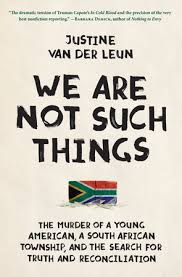
Thank you to the publisher and NetGalley for an advance copy of this book in exchange for an honest review.
This book is marketed as being along the vein of the podcast, Serial. Actually, I had a very hard time trying to make that connection. The book loses focus fairly often, and if the story told wasn’t so engrossing, I would have stopped reading. The author makes statements early about what she would find later, but nothing is settled and no further “truth” is exposed. Also, she searches for someone she calls a missing piece, and it makes no connection whatsoever to Amy’s murder.
I believed the focus of the story would be Amy Biehl, a white American, who was brutally attacked and murdered by a black mob in South Africa on August 25, 1993, at the end of apartheid. The author had recently moved to South Africa, and became engrossed with Amy’s story. She spent the next four years researching and writing the twists and turns she encountered in her search for the truth. Were the convicted killers really innocent? From that point, we receive a rich history lesson of how things were under apartheid, and how South Africa still struggles with divisiveness, reconciliation and forgiveness, and remains a very troubled country. While it certainly was interesting and eye-opening, the book lost its way and is less about Amy’s story than it is of Amy’s killers and South Africa’s complex society, in the distant past, during apartheid and today. As I said, the book was incredibly eye-opening, it was just not the direction I thought it was going to head. Also, Amy’s and her parent’s stories were just glossed over.
The book has many themes: racism, classism within each race, poverty, politics, injustice, apathy and, for Amy’s parents, forgiveness for her daughter’s killers who later received amnesty. I thought that would be the most notable part of this story, as her parents set-up a foundation in Amy’s memory, and employ their daughter’s killers at the foundation, yet it is never explored. In addition, Amy’s mother, Nancy, is described with a bit of disdain throughout the book, and I felt like it was a petty jealousy on the author’s part.
There was also a disjointed feel to the writing and the author describes people and places in such minute detail, you start to lose focus at times. There is also a strange dichotomy in the author’s portrayal of herself. On one hand she chastises the white and privileged for their attitudes, on the other she talks about importing her dog’s food and makes the admission that she consciously ducks her head to avoid the beggar in her neighborhood when she hears his crutches coming.
If nothing else, the book is thought-provoking and will perhaps spur me on to read more of South Africa’s struggles.